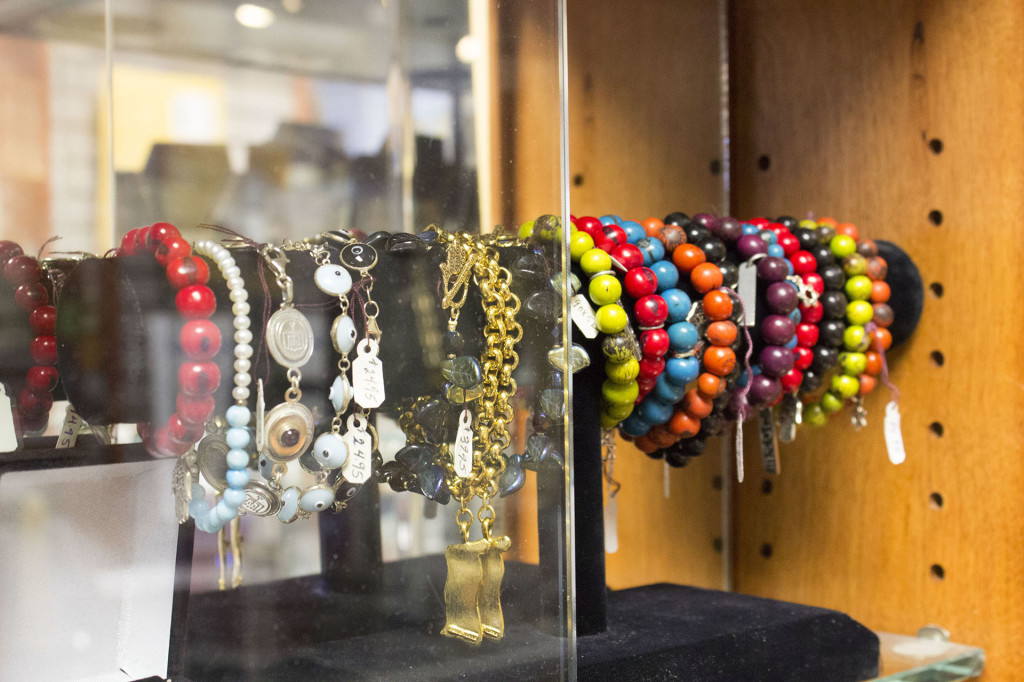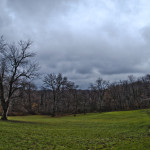Pinskers Judaica: A holy land oasis
by Mike Lynch
Pittsburgh is a long way from Israel—5,920 miles from the city of Tel Aviv, to be exact. But Pinskers Judaica Center in the heart of Squirrel Hill is bringing a little bit of the Holy Land to the Steel City.
Tucked in a Murray Avenue plaza between the generic looking “News and Toys” and “The Paper Shoppe,” Pinskers’ exterior aesthetics don’t do justice to its interior. The blue sign above the door, which reads “Pinskers Books & Judaica,” resembles all of the other blue signs along the sidewalk, but the menorahs cast in bronze, gold and silver displayed in the storefront windows capture the attention of passers-by.
A small glass bird is perched to the left of the door and watches eagerly as every customer passes through.
“Squirrel Hill’s a very multicultural neighborhood now,” owner Shlomo Perelman said, “and so, people who walk by have never seen a store like this before so they come in and look.”
Perelman, an Orthodox Jew with a long salt-and-pepper beard, has owned the store since 1983.
Today, he isn’t wearing the traditional yarmulke. Instead, he sports a faded black Pirates baseball cap. The Pirates are in the playoffs for the first time since the early 90’s, and Perelman is in a hurry to get home.
On a Sunday afternoon, the day after the Jewish Sabbath, business at Pinskers is winding down. Between the hours of 3 and 4 p.m., only one customer comes through the door; she buys a set of candles and leaves.
The 4,000-square-foot store is something like a corn maze. With so many spiritual items stuck in such a tight space, boxes are stacked wherever they can fit, leaving little room for walking.
Rabbi Daniel Wasserman of the Shaare Torah Congregation down the street moved to Pittsburgh 18 years ago and says he loves Pinskers for its convenience.
“It’s very nice to have a place on the avenue to stop in and see such a beautiful store and be able to get what you need,” he says.
The front of the store changes with the holidays, Perelman said. With Hanukkah beginning at the end of November, candies, candles and other small gifts blanket the walls next to the doors. Menorahs large and small decorate the shelving on the left.
A little farther on down the line, visitors will find a mix of elegant jewelry and plastic children’s toys. In a glass case, golden chains loop through the Star of David. Beneath a sign reading “Little Pinskers,” picture books rest next to plastic dreidels.
The right half of the store is devoted entirely to books. Hebrew scriptures sit cover-to-cover with kosher cook books, but Perelman’s been scaling back to expand the wine selection in the far end of the store. However, when the shop first opened, Perelman geared it towards Jewish rituals.
“In 1954 it was mainly to sell kosher wine and then later on they added Judaic items to the kosher wine merchandise,” he said. “It became sort of a retail service center for the Jewish community that provided products that weren’t easy to purchase in other venues.”
28-year-old Ariel Levaei started shopping at Pinskers nearly 10 years ago when she came to Pittsburgh as an undergraduate.
“I registered with them for my wedding and it’s very convenient having them here,” she said, “but now that it’s over and I have all my Judaica, we get wine.”
Perelman’s worked hard for the last 30 years to preserve the store’s Jewish tradition.
“I was looking for something that was a store that could close on the Jewish Sabbath and holidays,” he said. Sadly, he believes stores like his are a dying breed — and he’s right.
The number of religious Jews is shrinking in the United States.
According to a 2013 survey by the Pew Research Center, 62 percent of American Jews say being Jewish is just a matter of ancestry, while 15 percent say it’s all about religion. The other 23 percent stated they feel it’s a combination of both.
“PEOPLE WHO WALK BY HAVE NEVER SEEN A STORE LIKE THIS BEFORE, SO THEY COME IN AND LOOK.”
SHLOMO PERELMAN
Squirrel Hill is unique, though, in the fact that it’s been able to hold onto its vibrant Jewish community for so long. Perelman says it’s all in the land.
“Whatever Judaica stores are left have all moved out into the suburbs, except Pittsburgh,” he said. “The way the geography of Pittsburgh is, the distinct neighborhoods surrounded by rivers and mountains, retain those neighborhoods more readily because of topography.”
But Perelman said his shop isn’t just for the religious. It’s open for anyone to stop in and take a look.
“We’re a community store,” he said, “so we service the entire body of the community…We hope that people coming into the store are comfortable no matter what denomination they are.”
Rabbi Wasserman said a “Renaissance campaign” swept through Squirrel Hill about 18 years ago and has helped the neighborhood retain its identity.
“Time and neglect haven’t caused the community to begin to disintegrate,” he said. “And over the last 20 years, almost all of the Jewish institutions here in town have undergone a physical investment and a management, or a structural update.”
The state of Judaism in the United States may be shifting and Pinskers Judaica Center has done its best to evolve with the times, while still holding on to its traditions. In 1991, Pinskers started its mail order service at 1-800-JUDAISM and in 1996, launched Judaism.com.
Perelman believes it’s the store’s adaptability that’s helped it become a neighborhood staple.
“It reflects the fact that Squirrel Hill is still one of the few urban Jewish communities that have been in the same place for a hundred years,” he said after sampling a chardonnay.


 Previous Post
Previous Post Next Post
Next Post